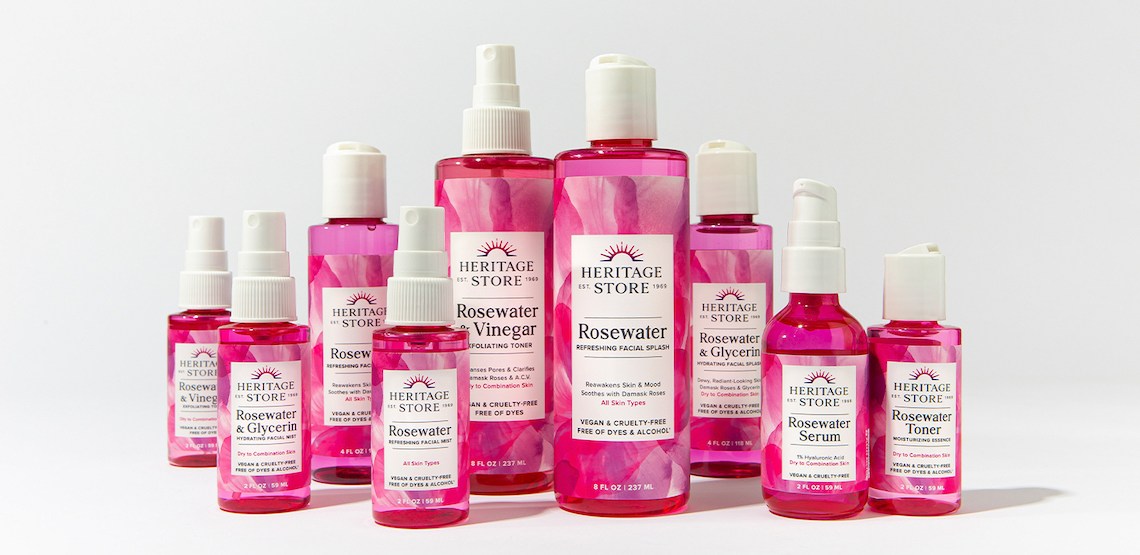Legacy botanical brand Heritage Store is seizing upon its natural and clean product history to level up its distribution and nab market share.
After the 50-year-old brand revamped its packaging and logo in April, it is now targeting a revised distribution strategy. The brand is best known for its rosewater and castor oil products and was typically found in Whole Foods, Sprouts and other health food locations. But since 2020, it has slowly added Target, Ulta Beauty and Urban Outfitters to its list of retail partners. It also sells via Cult Beauty in the U.K. As of December, it secured full Walmart stores distribution and launched two Amazon exclusive products and expanded to 1,900 CVS doors. All products sell for under $26.
Founder Tom Johnson sold The Heritage Store to health and wellness conglomerate Nutraceutical in 2010 for an undisclosed amount. In 2017, private equity firm HGGC acquired Nutraceutical for approximately $446 million. Heritage Store is among 50 brands in Nutraceutical’s portfolio. Monty Sharma, CEO of Nutraceutical, said he expects double-digit growth for Heritage Store in 2022.
Like every other brand, Heritage Store is trying to place itself wherever its consumers shop. Because of the explosive growth that the clean and natural beauty category saw over the last decade, Heritage Store customers are no longer only shopping for its products at niche organic and natural food stores. And just as importantly, retailers like Ulta Beauty and Walmart have created specific in-store merchandising areas to support brands like Heritage Store. Maura Cannon Dick, CMO of Skincare Brands at Nutraceutical, said Heritage Store divides customers into three buckets. The first group, referred to as “Spirited Individualists,” are 18- to 34-year-olds, who Cannon Dick said are just starting to explore the clean category. Then there are the “Self Care Spenders,” who are 35- to 49-years-old and have likely bought from the brand for years after discovering it in a health food store. With the expansion into new retailers, Heritage Store has developed a third bucket called “Trend Seekers” across the 18- to 49-year-old group. They’re interested in the latest beauty trends seen on celebrities, influencers and social media.
Among other portfolio updates and products launches, Heritage Store plans to launch two new rosewater products in January — a jelly mask and clay mask, to offer a full facial routine. The castor oil line will add a volume serum for brow and eyelash growth.
“For 2022, it all becomes a strategy of making sure that those points of distribution have the right [sales] velocities, and that we’re engaging with consumers and making sure that there are repeat purchases of our products,” said Sharma. He added that Heritage Store plans to increase its marketing and advertising investments in 2022 by 400%, compared to 2021.
Cannon Dick said the brand’s marketing investments will focus on the rose and castor oil lines. It will use digital products sampling, expand its influencer network and lean on user-generated content across paid and unpaid efforts.
“Trialing our products is key, and we are participating in various sampling opportunities way above and beyond what we have in the past — hundreds of thousands of samples. Some of them are retailer-specific programs or magazine partnerships. Our focus on UGC content for next year is also a big strategy and underscores a lot of our ad content,” she said.
Heritage Store has also tapped 100 beauty insiders, such as makeup artists. It’s part of a paid program to create video reviews and tutorials syndicated to retail partners through the software platform Bazaarvoice. She said it will also have larger editorial sponsorships with InStyle and Allure to try to “penetrate the celebrity ecosystem” and leverage their authority.
“We’re working on trying to take a disruptive approach toward marketing in 2022,” said Sharma. He declined to state specifics, stating that plans are not yet far enough along. “[We will try] disruptive ways to get more attention to our products and brand and get more people to try them. You can expect us to do something very different from what we’ve done in the past and different from a traditional marketing campaign.”




